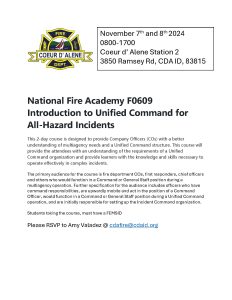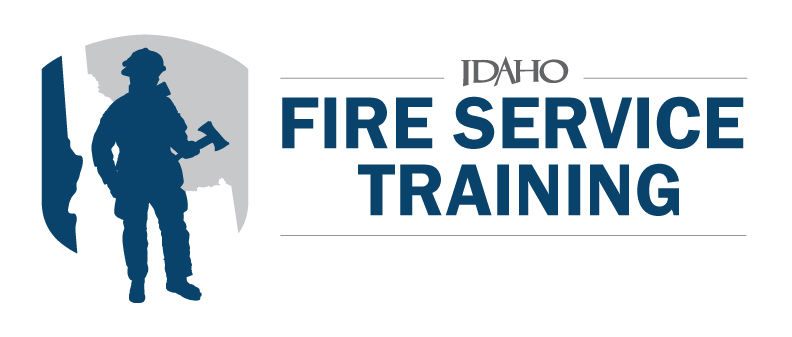Tag: NFA
NFA FO457 Decision Making for Initial Company Officer – Nov 9-10, 2024 – Kootenai County Fire & Rescue
Decision-Making for Initial Company Operations (F0457)
Kootenai County Fire & Rescue is the host.
615-25-C053 – NFA – Preparation For Initial Company Operations – Bonneville County Fire District
Curriculum: Incident Management
Develop a better understanding of the roles and responsibilities of Company Officers (COs) in preparing their company for incident operations, and learn about the transition from firefighter to CO.
10/12/2024 – 10/13/2024
in Ammon, ID
NFA-Leadership in Supervision – Perspectives in Thinking – Nampa FD
NFA-Leadership in Supervision – Perspectives in Thinking – December 9 & 10, 2024
Contact: Bobby Jardine, Division Chief of Training – Nampa Fire Department
jardiner@nampafire.org – (208) 605-4548
NFA-Leadership in Supervision – Perspectives in Thinking
This 2-day course provides the supervisor with the conceptual foundation and framework for success in leadership roles by exploring creative, analytical, political and critical thinking perspectives. The course addresses skills needed for assessing situations from multiple perspective, making critical decisions, fostering creativity and innovation, and using persuasion.
NFA Course FO636 Building Organizational Support for Community Risk Reduction, Ontario, OR – CANCELLED
https://www.srvtoa.org/upcoming-events
SRV Training Officer presents
NFA Course: F0636 – Building Organizational Support for Community Risk Reduction
Location: 55 NE 2nd Ave Ontario, OR 97914 (Ontario Public Safety Training Center)l
Date: November 30th to December 1st
Registration Link: https://forms.gle/FJoEEBT2ATi3B53GA
Course Information:
Building Operational Support for Community Risk Reduction is designed to help fire and emergency services learn what community risk reduction is and how to build organizational support for it so it becomes an organizational priority. This course will address the challenges fire departments face in balancing prevention and response. In many departments community risk reduction is still considered a low priority. This course will address the challenges you how community risk reduction can become a core value for your department that is displayed by every member playing a role in its success. This course will show you how your department can become more of a community player in times of decreased budgets.
There are three units of instruction:
Unit 1: Components of Strategic Community Risk Reduction.
Unit 2: Building Organizational Support for community Risk Reduction.
Unit 3: Community Risk Reduction as a service Priority.
There is a pre-course assignment that should take about 1 hour to complete. This assignment is located under the pre-course materials and course syllabus section.
For more information: Building Organizational Support for CRR (fema.gov)
Contact: Secretary@srvtoa.org
National Fire Academy FO609 Intro to Unified Command for All Hazards CANCELLED
CANCELLED Due To Lack of Students. Check out other NFA classes in the area.
2024 NFA Class Flyer CDA 11-7 (002)

NFA Course: Executive Skills Series: Leadership Through Difficult Conversations (F0522)

Location: Nampa, Idaho Sign Up: fst@cte.idaho.gov
Executive Skills Series: Exercising Leadership Through Difficult Conversations F0522
The purpose of this two-day course is to provide knowledge and skills for having difficult conversations to exercise leadership in addressing adaptive challenges. The goal of this course is for the participant to identify and apply skills for having difficult conversations as they relate to exercising leadership when addressing adaptive challenges.
DELIVERY TYPE
2-day off-campus
CONTINUING EDUCATION UNITS
1.4
ACE RECOMMENDATION
In the lower division baccalaureate/associate degree category, one semester hour in leadership, human resources, or public administration.
SELECTION CRITERIA
The primary target audience is fire and emergency service personnel in positions of authority (executive level officers) who have an opportunity to exercise leadership.
Note: Participants must be minimally assigned to a supervisory level position (for example, a Company Officer).
PREREQUISITES
None
POST-COURSE REQUIREMENTS
None
 Official Government Website
Official Government Website